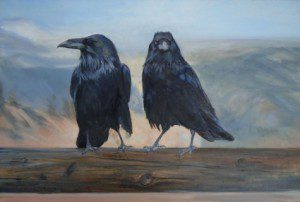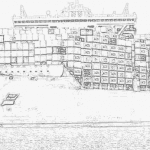Our nest is old and used by many others before us. It sits in the crotch of a huge eucalyptus on a hillside overlooking the harbor. Directly below rests an orange-tiled estate where we hunt for bugs under its eaves, drink from the fountain, and bask in the afternoon sun on its roof. As young birds we flew the island’s entire length to play with our brethren who nest in the cliffs near the two harbors. But now, we sit on the estate’s warm tiles and call to those sailing past. They beckon for us to follow, and when the wind is right, to fly north across the channel to the mainland. But we’ve flown enough, have claimed our territory, and know how to enjoy our days. The same can’t always be said for the humans who live at the estate.

A feather from my right wing flutters downward into the canyon. My mate circles above me. She dives toward the black quill and snatches it in her beak before it can drop into the oaks and sycamores that crowd the creek. Climbing, she flies past me, rolling in the soft afternoon air, croaking with delight, like she did as a young raven before we paired. She’s still playful after more than a decade of summers, though her feathers are as ragged as mine.
When we first occupied our nest only the man lived in the main house. He stood twice as tall as a fence post with brown hair on top of his pale body. One afternoon he staggered into the flat yard next to the house and slumped into a chair. In one claw, he clutched a bottle half-filled with amber liquid and in the other a glass. His head dripped blood. A woman wearing a dove gray uniform hurried after him. He sat trembling while she cut off his hair and stopped the bleeding. He touched her brown face with his mouth and she pushed him away, but not too hard. They moved inside. We swooped down, snatched up the hair from where it had fallen onto the patio stones, and used it to line the bottom of our nest. It felt soft, perfect for cradling eggs.
It took several moon cycles for the man’s hair to grow back, streaked with silver and thinner than before. He spent long days in the yard, staring into the small window of some kind of machine and picking with his claws at its buttoned board with odd markings on it. One day when he’d gone inside, I flew down and pecked at the board. It made weird beeping sounds and the scene in the window changed from a view of our island to strange markings – like those on the sheets of paper that sail through the town when the east wind blows hard. I dipped my beak into his glass of amber liquid. It tasted awful and I choked.
The man must have heard the commotion. He ran into the yard and shooed me away. I ruffled my feathers. My mate and I perched on the rim of our nest and complained loudly, our voices echoing down the canyon. I thought he would throw something at us. But instead, he just stared. Disappearing inside the house, he returned with a flat rock covered with pieces of something. He laid it on top of the stone wall that surrounded the estate then retreated to his seat.
“What do you think?” my mate asked. “Is it safe?”
“Stay here and keep watch,” I told her. “If he makes a move toward me, swoop down and give him a good peck. If he stays put, come join me.”
I flew from our tree and landed on the wall, croaking softly and watching the man. He leaned back, his mouth split open, showing teeth. I edged toward the flat rock, bobbing and weaving across the top of the wall. I smelled the food. The man didn’t move. I had devoured half of it before my mate joined me. We gobbled the rest, savoring the sweet taste of fruits that the humans often left behind in the side canyons where they lived in cloth houses and huddled around fires at night.
When we finished we flew to our nest. The man held some kind of machine to his eyes and pointed it at us. A soft click, click, click broke the mid-afternoon stillness. The brown woman joined him. She leaned forward and pressed her face against his. They sat together, face to face, and made low sounds. My mate dug me in the shoulder with her beak and flew out over the town toward the seaside rocks where pelicans and cormorants gathered to dry their wings in the afternoon sun. We danced and spun in the air, riding the currents. I flew upside-down with my claws linked with hers and cried out to other ravens. We didn’t return to our tree until the sun dipped below the ridgeline and the cold settled in.
Seasons passed. The brown woman grew large and then a little human joined the pair. The man continued putting out plates of food every day and my mate and I grew heavy. She hatched many chicks until last spring when she stopped. Another small one joined the man and woman. On warm afternoons, adult humans crowded the yard, drank much amber liquid, and ate until late at night, being more raucous than any of us ravens could ever be. On one afternoon, the man placed chunks of meat over a fire. The other humans stood back from the pit and away from its smoke.
“Look what he’s laying out for us,” my mate said.
“There’s too many of them around for us to try,” I said.
“Ah, come on. We’re ravens. We can do what we want. I’ll perch on the roof and start croaking while you grab some meat.”
I always knew my mate had a loud call; but that day she outdid herself. All the humans stopped what they were doing and stared at her, spreading their mouths and showing teeth. I flew high above the estate and dove at a steep angle toward the fire pit. At the last moment, I stuck out my legs and braked with fluttering wings. Landing on the edge of the pit, I leaned forward, stabbed a chunk of meat, and I took off. It felt hot and smelled delicious. The man ran toward me, his mouth open and complaining. I flapped hard and managed to climb to our nest where my mate joined me. A loud roar rose up from the crowd below. They lifted their glasses of amber and clear liquid into the air. We ate well that night and didn’t fly the whole next day.
The little humans grew bigger. They left the estate each morning and returned in the afternoon. The man’s hair turned silver and he slept most afternoons in the yard, winter and summer, with his blinking window machine and his bottles. Sometimes the brown woman would join him and they would call loudly to each other. Once he reached out and struck her across the face and she ran from his grasping claws. We didn’t see her for days. But our food plates kept coming and we decorated our nest with pieces of cloth swiped from the couple’s outdoor tables, scraps of pretty paper left from their gatherings, and fur from their fat tomcat. We had fun gently pulling out clumps of his soft gray coat while he lay sleeping in the sun. If we kept quiet, he wouldn’t even wake.
One evening, I woke from my nap to the sound of a large yellow machine with a light on its roof rumbling on the road next to the estate. The sun had dropped below the canyon ridge and the sky would soon be black.
“What’s going on?” my mate asked.
“Someone must be leaving,” I said. “Anytime one of those machines shows up someone leaves…or arrives.”
In the yard, the man and his brown mate called loudly to each other. The little ones clutched her blue-green dress and made strange whining sounds. The woman’s face looked wet and glistening, just like the small ones, like they had all been caught in a thunderstorm. At her feet rested boxy things with handles. The pair’s cries grew louder. The woman moved to the far edge of the yard, pulled something from one of her claws, something gold with a bright flash. She flung it into the dark canyon below. Grabbing the boxy things, she herded the little ones before her and they all climbed into the yellow machine. It rolled downhill to the ferry landing.
“What do you think that was all…” I began to ask. But my mate had flown from our tree and dove down canyon, disappearing into the black shadows. I called to her but got no reply. I waited. The light had almost disappeared before I heard the whoosh of her wings.
“Where did you go? I was…” I stopped speaking. In her beak she held a gold ring with shiny pieces of glass attached to it.
“I couldn’t leave it down there,” she said, her whole body shaking.
“It is pretty. But why go to all that trouble?”
“I don’t know. I just have a feeling that it’s important.” She pressed the ring into the side of our nest, right above a piece of yellow cloth, where the morning sun would catch it and make it gleam brightly.
For days we didn’t see the man. A strange old woman came from the house each morning and placed our food on top of the wall. The rains came and when the man finally returned to the yard, he sat in his chair and stared across the channel at the mainland while draining bottles of amber liquid. But when the sky brightened and the yellow coreopsis bloomed across the hillsides, he seemed to change. He drank from a clear bottle that he carried with him everywhere. During the day, my mate and I found him running along the ridge trails above the town, his body wet and glistening. He became slim, spent afternoons pounding madly on the window machine’s panel until darkness came. He showed his teeth a lot when he talked with other humans and always pointed us out to his friends.
One summer afternoon, a yellow machine pulled up to the estate and the brown woman and the two little ones climbed out. The man met them outside the main building. They moved to the yard and he sat with the woman. They linked claws while the little ones played in the fountain and chased each other in and out of the house, calling loudly, their voices high and burbling like the canyon creek after a storm. The man pressed his face against her face. They stayed that way for a long time.
With a flurry of action, my mate snatched the gold ring with its bright glass from the wall of our nest and soared upward into the darkening sky. I followed her, my shoulders aching from the effort and from age. We circled the humans in the yard. I called loudly until they looked up at us. My mate dove toward them and I followed. With a flutter of wings we landed on the table. They stared at us, open-mouthed. My mate waddled forward and dropped the ring from her beak in front of the woman.
Tracks of water glistened down the woman’s face. She picked up the ring. Her mouth spread wide, showing teeth. The pair made little coughing sounds.
We rose into the cool night, both of us struggling with the effort, and flew circles over the estate, croaking and watching the humans wave at us until the light failed.
“I knew she would want it back,” my mate said.
“You always were a romantic,” I replied, clacking my beak loudly at her.
We headed up canyon, black birds flying in a black night, and joined our aging brethren in the trees along the ridge road near the reservoir. We would share our stories with the others, let a young pair of ravens take over our nest, and wait until the time for our final flights.
***
Terry Sanville lives in San Luis Obispo, California with his artist-poet wife (his in-house editor) and one plump cat (his in-house critic). He writes full time, producing short stories, essays, poems, and novels. Since 2005, his short stories have been accepted by more than 180 literary and commercial journals, magazines, and anthologies including The Potomac Review, The Bitter Oleander, Shenandoah, and The MacGuffin. He was nominated for a Pushcart Prize for his story “The Sweeper.” Terry is a retired urban planner and an accomplished jazz and blues guitarist – who once played with a symphony orchestra backing up jazz legend George Shearing.




Leave a Reply